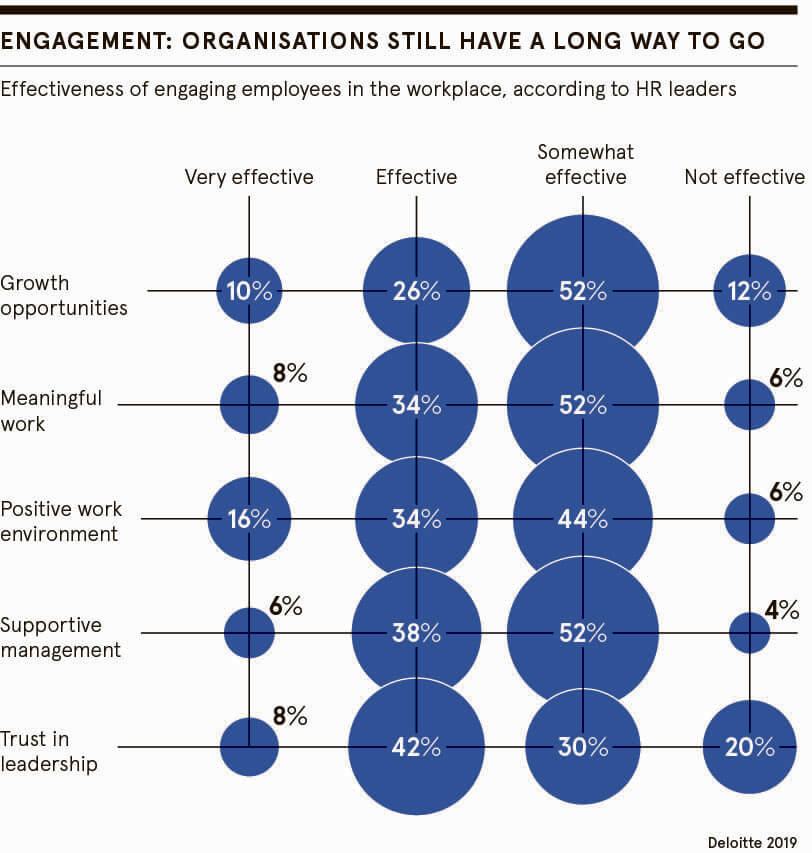Gone are the days when a company could get by without a sense of purpose. Now employees want to find meaning in their work and to know their organisation contributes to wider society in some way.
“That doesn’t mean we all want to put on a [superhero] cape and single-handedly save the world,” says Amber Coster, a business owner who has also worked in the tech industry. But employees do want to feel they can connect to their job and that they’re working towards something meaningful.
We seek workplaces that offer us this and so those with strong company values reap the benefits when it comes to talent acquisition, employee engagement, productivity and retention, research by US insights and strategy firm Purpose Generation has shown.
Coster says she works hard because she has a sense of purpose. She suffered a breakdown, partly caused by overwork and stress, in 2017. Since then she’s been on a mission to prevent others from experiencing burnout, too. “I’m connected to this mission so much and that keeps me going,” she says.
“Having a purpose is absolutely essential,” says Will Higham, behavioural futurologist. So, what role can HR tech play in helping to build one?
Social media and the search for meaning
First, it helps to understand why people care about company values at all. Millennial and Generation Z employees in particular want to work somewhere that has a strong sense of meaning, says Marga Hoek, business leader and author of The Trillion Dollar Shift.
Younger generations came of age during an era of uncertainty, witnessing the financial crash, with more awareness of climate crisis, she points out. “They have less trust in global economies and institutions, care about social and environmental matters, and have grown up with social media,” she says. “So, they stand up and take action.”
Things like internal analytics or a survey can provide feedback on the work employees are doing
But it’s not just young people. The internet has increased everyone’s awareness of global issues. In an increasingly secular era, many of us want to find a sense of purpose in life through our work, communities and activities, says Higham.
HR tech can help flesh out fundamental beliefs
To root out the defining values at a company’s core, businesses need to know who their team members are, what’s important to them, and must understand the employee experience.
Interactive technologies, such as Slack or Microsoft Teams, enable human resources managers to engage with and listen to employees. Through these platforms, team members can tell management the issues they care about. Employees want to be heard, Hoek says. Digital whiteboards where everyone can share ideas and knowledge are useful, she suggests.
Another way technology can help companies to flesh out their mission statement is through data. “Companies can use data, like business analytics and data science, to start to figure out how they become more purpose driven and to work out where they can have maximum impact,” says Anthony Impey, co-founder and chair of the Big Ideas Group at the Federation of Small Businesses.
“The world is full of things that need transforming. But what companies really need to do is focus on one particular problem and have a meaningful impact on that,” he says.
HR tech can be used to engage employees
Digital HR tools can be used to make employees feel more engaged with a company’s values. For example, internal HR systems can aid performance management and provide feedback on an employee’s work and the wider impact it has.
George LaRocque, founder and principal analyst at HRWins, says employees want to know that their work is contributing to the wider organisation and its impact. “Things like internal analytics or a survey can provide feedback on the work employees are doing,” he says.

Employees also want to be able to access training digitally. This also ensures employees in different offices have a shared understanding of company values. Janaina Tavares from ActionAid Brazil, a speaker on HR tech at UNLEASH Conference, says at her organisation training is done by an artificial intelligence-powered chatbot.
“Everyone has access to it and you’re not flying people around the world to be trained,” she says. Employees across a number of global offices can access the same information and work towards a shared, unified goal.
The impact of technology on company purpose
Technology can also be used to further a company’s mission statement and company values. For example, smart buildings, which use automated processes to control heating, air conditioning and lighting, could contribute towards a company’s sustainability goals. “Companies that have smart offices are really talking the talk,” says Higham.
Increasingly, conscientious workers are calling for organisations to be more transparent. So, businesses need to communicate the impact they are having to their employees. Again, digital communication platforms like Slack and Microsoft Teams can help.
“To understand the purpose of your work you have to have access to information,” says LaRocque. Employees want to hear about any developments. “It’s about providing transparency from the top down,” he says.
Businesses can also use apps and devices to encourage employees to contribute to company values directly, for example to enable them to donate money towards a cause.
However, HR tech by itself is not a “superpower”, says Impey. It’s a tool that can be used to help expand and further a company’s purpose. But organisations have to be authentic and genuinely commit to a value system for it to be of any use.
LaRocque points out that employees still want fair pay and benefits, first and foremost. However, in addition, companies that provide a sense of purpose benefit everyone, from business leaders to employees and society at large.
Social media and the search for meaning
HR tech can help flesh out fundamental beliefs
HR tech can be used to engage employees






